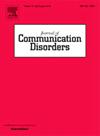Relationships between executive functions and vocabulary knowledge in Spanish-speaking children with and without developmental language disorder
IF 2.1
3区 医学
Q2 AUDIOLOGY & SPEECH-LANGUAGE PATHOLOGY
引用次数: 0
Abstract
Developmental language disorder (DLD) is often associated with deficits in executive functions (EFs). One common area of language difficulty in DLD is the development of vocabulary knowledge and it has been suggested that EF abilities may be linked to this difficulty. However, an explanation for this relationship remains unclear. The rationale for the current study examined the relationship between EFs and two aspects of vocabulary knowledge, receptive vocabulary size and vocabulary depth, in Spanish-speaking children with and without DLD. Vocabulary skills, the EFs of interference control, response inhibition, verbal and nonverbal working memory, and switching, were assessed in a total of 204 children aged 6–8 years: 105 with DLD and 99 with typical development (TD). Relationships were assessed using multiple regression models and path analysis, including EF as predictors, receptive vocabulary size and vocabulary depth as outcome or mediating variables, and age and non-verbal intelligence as covariates. In children with DLD, the EFs verbal working memory and switching were directly associated with receptive vocabulary size and indirectly with vocabulary depth. This indirect relationship was mediated by receptive vocabulary size. In contrast, no EFs were associated with receptive vocabulary size, and vocabulary depth in the TD group. These results suggest that verbal working memory and cognitive flexibility play a role in the cognitive mechanisms linked to vocabulary development in school children with DLD. Intervention programs aimed at improving vocabulary in this population should include EF activities.
有与无发展性语言障碍的西班牙语儿童执行功能与词汇知识的关系
发展性语言障碍(DLD)通常与执行功能缺陷(EFs)有关。DLD中一个常见的语言困难领域是词汇知识的发展,有人认为EF能力可能与这种困难有关。然而,这种关系的解释仍然不清楚。本研究的基本原理是考察有和没有语言障碍的西班牙语儿童的情感表达与词汇知识的两个方面,即接受性词汇量和词汇深度之间的关系。本文对204名6 ~ 8岁儿童的词汇技能、干扰控制、反应抑制、言语和非言语工作记忆、转换能力进行了评估,其中DLD儿童105名,TD儿童99名。使用多元回归模型和路径分析评估关系,包括EF作为预测变量,接受词汇量和词汇深度作为结果或中介变量,年龄和非语言智力作为协变量。DLD儿童的言语工作记忆和转换与接受性词汇量直接相关,与词汇深度间接相关。接受性词汇量介导了这种间接关系。相比之下,在TD组中,ef与接受性词汇量和词汇深度没有关联。这些结果表明,言语工作记忆和认知灵活性在与DLD学龄期儿童词汇发展相关的认知机制中发挥了作用。旨在提高这一人群词汇量的干预计划应该包括EF活动。
本文章由计算机程序翻译,如有差异,请以英文原文为准。
求助全文
约1分钟内获得全文
求助全文
来源期刊

Journal of Communication Disorders
AUDIOLOGY & SPEECH-LANGUAGE PATHOLOGY-REHABILITATION
CiteScore
3.30
自引率
5.90%
发文量
71
审稿时长
>12 weeks
期刊介绍:
The Journal of Communication Disorders publishes original articles on topics related to disorders of speech, language and hearing. Authors are encouraged to submit reports of experimental or descriptive investigations (research articles), review articles, tutorials or discussion papers, or letters to the editor ("short communications"). Please note that we do not accept case studies unless they conform to the principles of single-subject experimental design. Special issues are published periodically on timely and clinically relevant topics.
 求助内容:
求助内容: 应助结果提醒方式:
应助结果提醒方式:


